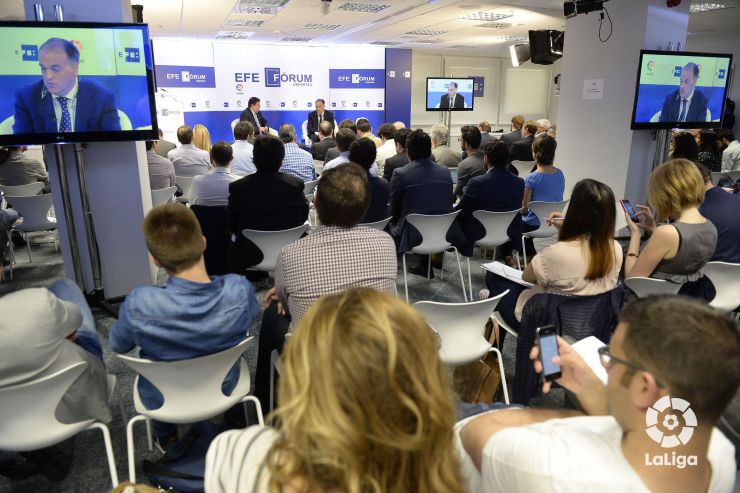Nota de Prensa
JUE 14.05.2015
In 2013 professional football in Spain generated over 7.6 billion euros gross value added, which constituted 0.75% of GDP in Spain. This contribution to GDP has grown at an annual rate of 2.7% since 2011.
That is the main conclusion of a report entitled ‘The Socioeconomic Impact of professional football in Spain’, produced by KPMG, based on analysis of the direct, indirect and induced effects produced as a consequence of the activity of professional football in Spain, including the first and second divisions (the Liga BBVA and Liga Adelante, respectively) and based on a survey of the Spanish population in relation to their habits related to the sport, carried out in 2014.
If we look at the direct impact of professional football on GDP, the index increased by over 3.6 billion euros in the 2012/13 season, of which 75% came from spending by fans and an approximate 16% corresponded to the earnings of clubs from advertising and merchandising sales, among other areas.
Supporters spent a total of 2.8billion in the same year, of which 923 million euros came from the ‘quiniela’ (football pools) and online betting, almost 600million from ticket sales, competitions, season tickets, club membership fees, and up to 515million euros in subscriptions to pay television channels, among others.
Professional clubs earned 246million euros via supporters spending money on tickets and competitions, with Primera División clubs exceeding 95% of their earnings from this concept. In terms of income from season ticket holders and members, clubs earned 348million euros in the 2012/13 season, of which 330million came from the Primera División.
The rest of the direct earnings, some 860million euros, came from businesses, with no intervention from clubs, seeking to improve their marketing strategies towards professional football in the Primera and Segunda División, registering an advertising investment of 290million euros in the written and broadcast press.
On the other hand, the indirect contribution of professional football on Spanish GDP reached 2.995 billion euros in 2013. The sectors that benefitted the most were cultural and sporting activities, telecommunications and construction, among others.
As well as contributing 0.75% of the country’s GDP, professional football has boosted job opportunities all over Spain, generating 140,000 full time jobs in 2013, of which 66,000 were created indirectly and 17,000 were induced.
In terms of positive fundraising, footballing activity allowed the Public Administration to generate total earnings of 2.896billion euros during 2013, in other words, an impact of 38.8% generated on Spanish GDP. 36% of these funds corresponded to VAT (1.05 billion euros), 25% in Social Security (723million euros), 20% in business tax (592million euros), 14% in income tax (415million euros) and 4% as a consequence of Special Taxes (113million euros).
In addition to boosting the Spanish economy, professional football also has a very positive impact on society. 54% of the population believes that football makes the biggest contribution of any sport to Spain’s global brand, more than tennis and basketball. What’s more, from a health point of view, 79% of people believe that professional football stimulates the practice of football in general.
About the study
The study focused on three areas: (1) the contribution to GDP, in terms of gross value added generated by different agents involved in professional football, both directly and indirectly. (2) The creation of full-time jobs (3) money raised from taxes associated with football, including: VAT on consumer products and services offered by professional football, as well as special taxes, income tax and social taxes on jobs related to football and business taxes on business involved in football, either linked to clubs or externally.
The results obtained are based on analysis of public information available (8 official institutions/associations and 11 specialised reports), which has been richly complemented by conducting interviews with supporters and experts in the sector. The results of these surveys were formed by over 100 people, aged between 18 and 65.
CLICK HERE TO READ THE 'SOCIECONOMIC IMPACT OF PROFESSIONAL FOOTBALL IN SPAIN'
© LALIGA - 2015



